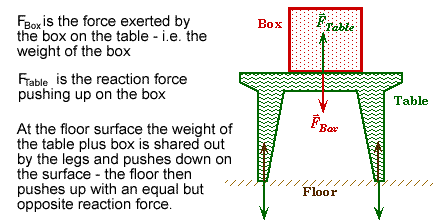    |
||||

Newton's Third Law |
||||
|
Newton's third law of motion states that for every force acting on an object, the object will exert an equal force on its cause but in the opposite direction'. Another way of saying this is: 'Whenever two bodies interact, the forces they exert on each other are OR 'To every action there is an equal and opposite reaction'
This force that opposes the weight is called the reaction force. If the object is reacting against a solid object the reaction force is simply the upwards push of the object it is resting on but if it is in a liquid upthrust comes into play. When a body is wholly or partly immersed in a fluid, it experiences an upthrust or buoyant force equal to the weight of fluid it displaces.Practically upthrust is the difference between the object's weight in air and its 'weight' in the fluid (although it's weight w=mg does not actually change!). If the upthrust is as big as the weight the object will float. If not, it will sink, but the acceleration it will sink at will depend on the difference between the weight and the upthrust, not just its weight.... therefore the acceleration rate will be lower. (See Archimedes Principle) |
||||
 |
||||

 When a book rests on a table the book exerts the force of its weight on the table and the table exerts an equal force (but in the opposite direction) on the book.
When a book rests on a table the book exerts the force of its weight on the table and the table exerts an equal force (but in the opposite direction) on the book. 
